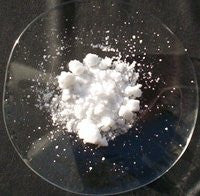Potassium Carbonate
Technical grade
Synonyms: Potash, Pearl Ash
CAS Number: 584-08-7
Potassium carbonate (K2CO3) is a white salt, soluble in water (insoluble in alcohol). It can be made as the product of potassium hydroxide's absorbant reaction with carbon dioxide. It is deliquescent, often appearing a damp or wet solid. Potassium carbonate is used in the production of soap and glass and is used in planted aquariums to increase carbonate hardness (KH).
Uses for Potassium Carbonate:Pearl ash has been used for soap, glass, and china production.
Pearl ash added to hard water will soften the water.
In planted aquariums it is used to increase the carbonate hardness (KH) and helps stabilise the pH. 1.2g of potassium carbonate per 25 litres of water = 2dKH. In addition it adds the important nutrient, potassium to the tank. Potassium Carbonate when added at a rate of 0.011g per litre of tank will increase the potassium level by 6ppm.
In the laboratory, it may be used as a mild drying agent where other drying agents such as calcium chloride and magnesium sulfate may be incompatible. However, it is not suitable for acidic compounds, but can be useful for drying an organic phase if one has a small amount of acidic impurity.
Mixed with water it causes an exothermic reaction.
It is mixed with distilled water to make a safer electrolyte for oxyhydrogen production than potassium hydroxide, the more commonly used electrolyte.
Aqueous potassium carbonate is also used as a fire suppressant in extinguishing deep fat fryers and various other B class related fires.
An ingredient is welding fluxes, and in the flux coating on arc welding rods
PLEASE NOTE: This product is not for human or animal consumption.
Properties
- Molecular formula: K2CO3
- Molar mass: 138.205 g/mol
- Appearance: white, hygroscopic solid
- Density: 2.29 g/cm3
- Melting point: 891 C, 1164 K, 1636 F
- Boiling point: decomposes
- Solubility in water: 112 g/100 mL (20 oC), 156 g/100 mL (100 oC)
- Solubility: Insoluble in alcohol, acetone
